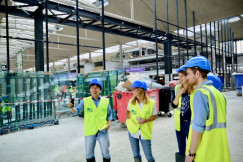Library
27 May 2025
Fighting Racism through Community Empowerment: The Role of the Social Economy in Implementing the EU Anti-Racism Action Plan
Library
27 May 2025
Working conditions and governance
Proximity and social economy
Addressing capacity and skills gap
+9 more
Login / create an account to be able to react
-
9

The European Commission’s 2024 progress report on the EU Anti-Racism Action Plan highlights continued racial and ethnic discrimination across Europe, with limited reporting and persistent socio-economic inequalities. Despite the adoption of national action plans by some Member States, challenges remain in ensuring community participation and impact. Social economy organisations, with their values of inclusivity and local engagement, are uniquely positioned to help implement anti-racism strategies on the ground and support long-term structural change.
Topics
EU-27
Academic / Research and VET Institutions
Business Support Organisation
Company with 250 or more employees
Cluster Organisations
Consumer Organisations
Cultural and Heritage Organisations
Destination Management & Marketing Organisations
EU Institutions
Financial Institutions and Investors
Industry Associations and Chambers of Commerce
International Organisations
Local Authorities
Media / Journalist Organisations
National authorities
Networks and Federations / Confederations
NGOs / Non-profits
Notified Bodies
Regional Authorities
SMEs (a company with less than 250 employees)
Social Economy Entity
Trade Unions
Other
-
Thematic area
-
-
Working conditions and governance
-
-
Interlinkages with other sectors
-
-
Proximity and social economy
-
-
Action areas and keywords
-
-
Addressing capacity and skills gap
-
Advancing gender equality and safety at work
-
Certification, labelling and self-regulation
-
Corporate social responsibility (CSR)
-
Economic democracy
-
ICP rights & workers involvement
-
Industrial relation and social dialogue
-
Local Green Deals, green business communities and citizens’ initiatives
-
-
Ecosystem focus
-
-
Social economy
-
-
Scope of activity
-
-
International
-
Share
In late 2024, the European Commission released a report reviewing the progress of the EU Anti-Racism Action Plan (2020–2025), a landmark framework designed to tackle racial and ethnic discrimination across the Union. Adopted in 2020, the Action Plan called for concrete steps to promote equality, pluralism, and inclusion in Member States. Four years on, the report acknowledges some improvement but warns that deep-rooted disparities remain. Over 61% of Europeans still perceive racial discrimination as widespread, while only a fraction of those affected report incidents. Discrimination continues to impact employment, education, housing, and healthcare—particularly for vulnerable groups such as migrants and Roma.
While 11 Member States have adopted national action plans against racism, questions linger over the level of community involvement in shaping these policies. Many marginalised groups face barriers in accessing support and distrust in public institutions, underlining the need for local mediators and community-based approaches.
This is where the social economy can play a transformative role. Social economy organisations are grounded in values of solidarity, democratic governance, and inclusivity. Their people-first approach, community embeddedness, and track record in employment and empowerment initiatives make them ideal partners in fighting systemic racism. These organisations can bridge the gap between EU institutions and marginalised communities by enabling inclusive dialogue, co-designing interventions, and gathering on-the-ground data to inform policy.
The work of Diesis Network exemplifies the social economy’s impact.
Through projects like LABOUR-INT 2, MEDICI, RIDE, and ROMANSE, Diesis has supported the labour inclusion of vulnerable migrant and Roma populations, especially women. These efforts include IT training, entrepreneurship support, and EU-wide capacity-building to promote integration and tackle discrimination in the job market.
To ensure real progress, the Commission calls for a multi-level participatory approach. This includes working with the EU’s dedicated Coordinator on combating racism and engaging with civil society through the Permanent Anti-Racism Civil Society Forum. However, the report stresses that more must be done to create inclusive civic spaces and foster active community participation in decision-making.
Ultimately, building a Union of Equality requires more than policy frameworks—it needs committed actors capable of translating these ambitions into action. Social economy organisations, with their rootedness in community needs and drive for social justice, are essential allies in this process. Their deeper involvement would not only support anti-racism objectives but also align with the EU Social Economy Action Plan and contribute meaningfully to inclusive economic growth.
Comments (0)
See also
-
4
Working Conditions and Governance Highlights April and May 2025
- Categories
- Proximity and social economy Agri-food Construction +62 more
-
58
Employee Ownership: an intergenerational industrial transition and inclusive growth model
- Categories
- Partnerships Skills Working conditions and governance +47 more
-
8
Shaping Europe’s Industrial Future - EU Industry Days 2025, Rzeszów
Rzeszów, Poland
- Categories
- Urban and Rural Wellbeing Working conditions and governance Proximity and social economy +18 more




